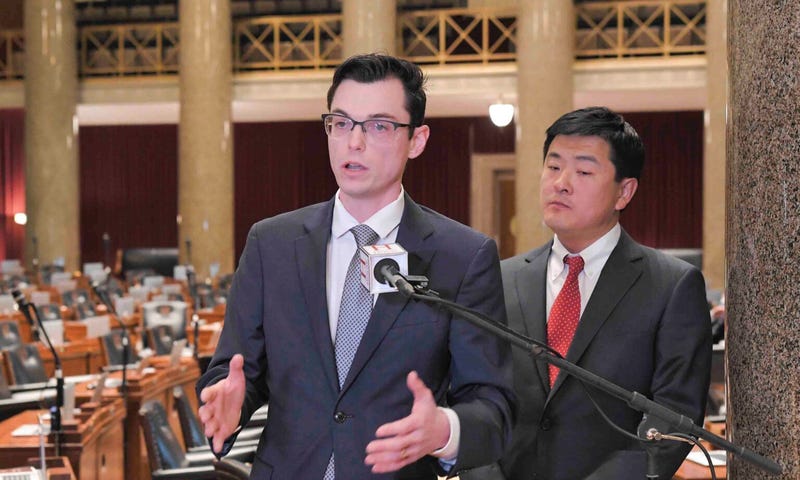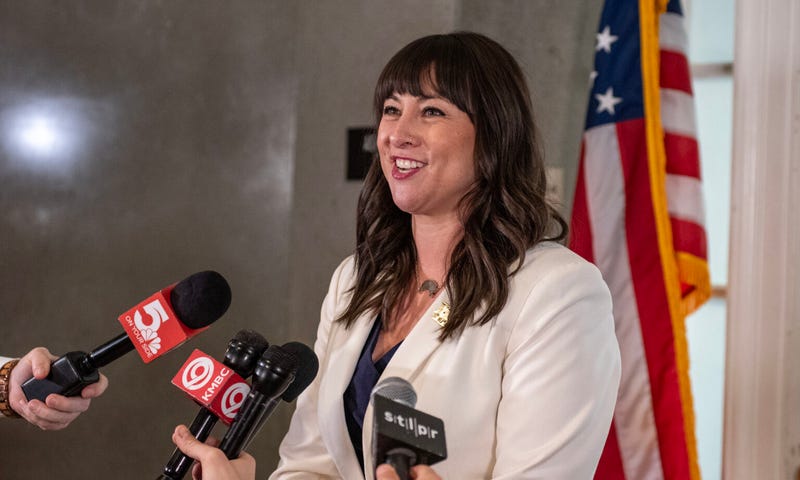
The Missouri House on Monday moved the new congressional district map demanded by President Donald Trump one step closer to passing.
The only drama during the more than four hours of debate was whether any Republicans would vote against the revisions intended to give the GOP safe seats in seven of Missouri’s eight congressional districts.
When the vote came to give preliminary approval to the new map, 12 of the chamber’s 107 Republicans — including House Speaker Jon Patterson of Lee’s Summit — voted against it, along with all Democrats present. The vote was 89-63, setting up a final vote Tuesday that will send the bill to the state Senate.
Once the debate began, state Rep. Dirk Deaton, the Republican from Noel who is sponsoring the new map, said the legislation is an attempt to “improve” the redistricting plan approved at the end of tumultuous debates in 2022.
Deaton denied that the map was designed in the White House and given to lawmakers to pass.
“This map came from the governor’s office, and it was written at the governor’s direction by the staff,” he said.
Under questioning from state Rep. Jo Doll, a Democrat from St. Louis, Deaton said redistricting was not an issue in the regular session earlier this year because there was no consensus, no “groundswell of support” to work on redistricting during the regular legislative session.
Doll responded by accusing Republicans of manipulating the electoral process for one reason — because Trump demanded it.
“This is nothing more than the Republican Party pandering to Donald Trump and his agenda,” Doll said. “We all heard the directive. We’re not stupid over here, we know where this came from. And it’s not the governor’s office.”
House Minority Leader Ashley Aune, a Democrat from Kansas City, said at a news conference before the debate that she expected most Republicans who oppose the bill to remain silent.
“It’s what they do day in and day out in this building,” Aune said. “It is exhausting to watch, but it is their normal, and I’m certain that it will happen again.”
Gov. Mike Kehoe called the special session after weeks of speculation following a report in late July that Trump wanted Missouri to redraw districts so the GOP could take the 5th District, currently held by U.S. Rep. Emanuel Cleaver of Kansas City.
Texas lawmakers were already meeting to find Republicans five additional seats in the 34-member delegation from that state. California has followed suit, putting a new map on the ballot for November intended to shift five seats to Democrats.
With those large states cancelling each other out, the fight has moved to smaller states like Missouri. With a 219-212 majority in the 435-seat House of Representatives — four seats are vacant, including three previously held by Democrats — Republicans are worried that a small shift in voter sentiment could put them again in the minority.
Revising congressional district lines occurs every 10 years, after the allocation of seats following the federal census. The state Constitution mandates it but is silent on whether lawmakers have the power to do so at other times.

Democrats seem resigned to losing the initial battle in the legislative chambers, but hold out hope for defeating the measure in court or at the ballot box.
The lack of clear authority for mid-term redistricting, as well as procedural questions in the special session, are ripe for the courts to decide, Aune said.
“It’s unconstitutional from the start to the finish,” she said during the news conference.
Cleaver has vowed to sue if lawmakers pass a new map.
Deaton also defended the map as constitutional, arguing that Democrats’ warnings they will sue would be doomed to failure.
“There’s no evidence to support this,” Deaton said. “There’s nothing to back this up, just ‘this is unconstitutional.’”
The bill was given first-round approval without an emergency clause that would make it effective with Kehoe’s signature. If the bill is passed as expected, opponents would have 90 days to gather signatures to force a statewide vote on the bill.
St. Louis Public Radio reported Monday that the Missouri AFL-CIO is considering whether to launch a petition drive to force a referendum vote. If enough signatures are gathered before the law takes effect, it would be held in abeyance until after the vote.
The bill makes many changes to the current districts to bring enough Republican voters into the 5th District to flip it to the GOP and distribute Democratic votes to dilute their impact on other districts.
The 5th District does see the most substantial changes. Previously encompassing nearly all of Kansas City, the district now only includes the city’s east side, then stretches east to encompass Jefferson City all the way to Phelps County. It also includes the northern portion of Boone County, but not the Democrat-leaning areas of Columbia.
The 5th District also picks up six counties from the 3rd District — Cole, Cooper, Howard, Maries, Moniteau and Miller counties as well as Morgan County from the 4th District.
The 4th and 6th Districts are where the Kansas City voters who previously all lived in the 5th will be moved.
The 4th District loses parts of Columbia, along with Sedalia and Warrensburg to the 5th District in order to pick up downtown Kansas City. It is represented by Republican Mark Alford.
The 6th District runs across the entire northern half of the state, picking up a piece of Kansas City north of the Missouri River.
Two districts would be untouched — the 7th District in southwest Missouri and 8th District in southeast Missouri, both represented by Republicans. It only tinkers with the 1st District, based in St. Louis and represented by Democrat Wesley Bell.
Other changes made on the east side of the state would swap voters between the 2nd and 3rd districts.
The 2nd District, represented by Republican Ann Wagner, moves south of the Missouri River, taking in southern St. Louis suburbs along with Gasconade, Crawford, Jefferson and Washington counties.
The 3rd District, represented by Republican Bob Onder, takes over all of St. Charles and Warren counties, adding Audrain, Lincoln, Monroe, Pike and Ralls counties as it stretches north to Hannabil and encompasses nearly all of Columbia.
As Aune predicted, there were few Republicans willing to buck the party majority to oppose the bill.
State Rep. Marty Joe Murray, a Democrat from St. Louis, said Republicans had told him in whispers that they didn’t believe in the bill.
“Why aren’t they here, saying that on the microphone?” he said.
Several GOP members had said, when the idea was first being floated, that they didn’t want to go through redistricting again. Only one Republican spoke against it on the floor.
State Rep. Tony Harbison, a Republican from Arcadia, said he’s concerned about senior centers in his district being able to provide meals and property taxes that are forcing people out of their homes.
“Our plate is full of things that need to be done for the people of this state,” Harbison said, “and this ain’t one of them.”
Missouri Independent is part of States Newsroom, a nonprofit news network supported by grants and a coalition of donors as a 501c(3) public charity. Missouri Independent maintains editorial independence. Contact Editor Jason Hancock for questions: info@missouriindependent.com.
